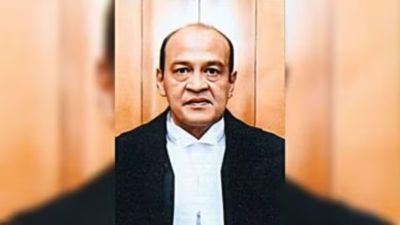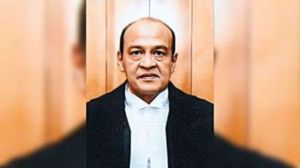‘CBI can’t be faulted’: Delhi court accepts closure report 8 yrs after JNU student Najeeb Ahmed went missing
While accepting the agency's closure report, the court granted liberty to reopen the case if any evidence in the matter came about.
 Najeeb, who was then 27 years old and an MSc student at the School of Biotechnology in JNU, allegedly got into a scuffle with some Akhil Bharatiya Vidyarthi Parishad (ABVP) members before he went missing. (Express Archive)
Najeeb, who was then 27 years old and an MSc student at the School of Biotechnology in JNU, allegedly got into a scuffle with some Akhil Bharatiya Vidyarthi Parishad (ABVP) members before he went missing. (Express Archive)More than eight years after Jawaharlal Nehru University (JNU) student Najeeb Ahmed went missing, a Delhi court on Monday accepted a closure report filed by the Central Bureau of Investigation (CBI) in the unsolved case. The court was hearing a protest petition against the closure report filed in 2018, moved by his mother, Fatima Nafees.
Najeeb Ahmed, who went missing on October 15, 2016, from his hostel, was 27 at that time. An MSc student at the School of Biotechnology in JNU, he allegedly got into a scuffle with some Akhil Bharatiya Vidyarthi Parishad (ABVP) members before he went missing.
“In a volatile atmosphere like the hostel elections and more so in a campus like JNU, such scuffles and exchanges are not unheard of, but the same is not a sufficient basis to conclude that these young students would go to an extent to cause disappearance of another student, especially when there is no evidence on record to suggest the same,” said Additional Chief Judicial Magistrate Jyoti Maheshwari of the Rouse Avenue Court.
“This Court is cognizant of the plight of an anxious mother who has been on a quest to find out about her missing son since 2016, but the investigating agency in the present case, i.e. CBI, cannot be faulted for the investigation carried out. The quest for truth is the foundation of every criminal investigation, yet there are cases where the investigation conducted cannot achieve its logical conclusion, despite the best efforts…,” the court added.
While accepting the agency’s closure report, the court granted liberty to reopen the case if any evidence in the matter came about. The CBI had recently informed the Additional Chief Judicial Magistrate that they were unable to record the statement of a doctor at Safdarjung Hospital.
Najeeb was allegedly taken to this hospital after being injured in the scuffle, but the CBI said no document pertaining to his hospital visit was found. The agency claimed that Najeeb returned to the hostel without getting a medico-legal case report prepared. After finding no evidence in the case despite multiple attempts, the CBI closed its investigation in 2018. Before the CBI began investigating the case, the Delhi Police had attempted to locate the student.
“…since no examination of Najeeb Ahmed took place at the hospital, there was no occasion for CBI to question the doctor at Safdarjung Hospital, as the same would have been an exercise in vain,” the ACJM noted.
In the protest petition, Nafees alleged that the CBI had not conducted a proper investigation into the possible role of the nine suspects. The CBI, however, told the court that call details records of these suspects were scrutinised, but no link to Najeeb’s disappearance was found. The CBI had also earlier moved an application to conduct a polygraph test of these suspects. This application was rejected by a Delhi court because the person had refused to consent.
“…while the allegations regarding physical assault and verbal threats against Najeeb Ahmed on the night of 14.10.2016 are supported by witness testimonies, the link between those events and his subsequent disappearance on 15.10.2016 is not borne out by any direct or circumstantial evidence on record,” ACJM Maheshwari said in her order.
“From a conspectus of the facts and circumstances, it is evident that all conceivable aspects which could have been investigated upon have been thoroughly covered by CBI… (it) has undertaken a holistic investigation and exhausted all options,” said ACJM Maheshwari.
“…when Najeeb left the hostel room, his mobile phone and laptop were lying in the room only. Therefore, there was no information or trace left by Najeeb Ahmed, from which his whereabouts could be ascertained or any clue regarding the same could be received,” she added.
After Najeeb went missing, massive protests broke out outside the JNU Vice-Chancellor’s office in 2016. Various student wings pinned the blame on the V-C for allegedly failing to act decisively in the matter.
The Delhi Police had filed an FIR under Section 365 (kidnapping or abducting with intent secretly and wrongfully to confine a person) of the Indian Penal Code (IPC) and announced a reward of Rs 50,000 for any information on Najeeb.
Nine persons were identified as suspects, and CCTV footage from nearby metro stations was examined. Wireless messages were sent to senior superintendents of police (SSPs) of all districts in the country on the day he went missing. Four teams were sent along various routes, including Delhi-Agra, Delhi-Bulandshahr, Ghaziabad, Moradabad, and Rampur.
On December 19 and 20, 2016, over 500 police officers searched the JNU campus, including academic blocks, hostel complexes, water tanks, and septic tanks. All their efforts turned out to be futile.
In late 2016, dissatisfied with the efforts of the police, Nafees decided to approach the Delhi High Court with a habeas corpus writ petition seeking her son’s production. Six months later, on May 16, 2017, the High Court passed the case to the CBI. A year later, on May 11, 2018, the CBI told the Delhi High Court that it had found no evidence of any crime committed against Najeeb.
The CBI’s investigation involved questioning 26 people, including JNU officials, staff, friends, and colleagues. The agency also examined mortuaries in 12 cities and scrutinised railway records for a full year. Despite this, the CBI’s investigation could not reach a conclusion.












